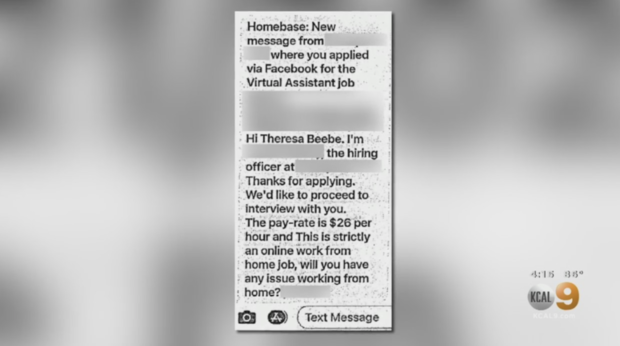Californians Lost More Than $620 Million To Online Scam Artists In 2020
LOS ANGELES (CBSLA) - In 2020, Americans lost $4.2 billion to online scam artists, with Californians suffering the greatest losses compared to the rest of the country.
According to a recent study by the identity verification website Social Catfish, state residents lost more than $621 million last year, three times more than scammers earned in 2017, and the age group with the largest loss growth was 18 to 39-year-olds.
Theresa Bebee was recently the victim of an online scam. She lost her job last month and was searching for new employment on Facebook Jobs.
"First thing I see matched my qualifications. Oh, this is great," she said.
The very next day, Bebee received a text asking for an interview. It lasted three hours and was all done online.
"Everything was by the book," Bebee said. "Nothing seemed odd to me."
She was offered the job and during the onboarding process, done online, she provided everything from her driver's license to her social security number and banking info to what she assumed was her new employer. It turns out, though, there was never a job and the scammers used Bebee's identity to make a fraudulent unemployment claim.
"Get this, they put the late date of employment as 2020. So, they wanted 15-months backpay," she told CBSLA.
The most common scams reported in the study were business emails being compromised, with romance scams coming in second.
"We polled 700 people who lost money through romance scams, and what we found was Facebook, Google Hangouts, WhatsApp and Instagram were the top networks. Obviously, those are the largest, but those are the top social networks where people are losing the most amount of money and they're not necessarily dating sites," David McClellan, CEO of Social Catfish, said.
McClellan also said that a lot of victims of scammers are unknowingly using websites they shouldn't and are giving out information because their friends do it and they don't think there's anything wrong with it.
Social Catfish's study also showed that while some scammers ask for money outright, most thieves went after victim's personal identities, like what happened to Bebee.
"I come home and shut my blinds and keep the lights off. I hangout in my room. I'm scared. They have all my information," Bebee said.
Experts said the best thing people can do to protect against online scams is always ask to meet whoever they're interacting with face-to-face, even if it's over Zoom, before giving away any person information, even the name of your pet or the street you grew up on. Scammers can steal identities with information that many people may assume is seemingly meaningless.




